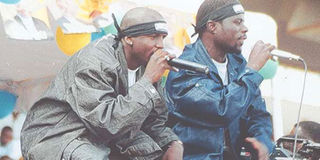How music drives Kenyan politics

Musicians Gidi Gidi Maji Maji of the hit campaign song "Unbwogable". PHOTO| FILE| NATION MEDIA GROUP
What you need to know:
Erstwhile critics turned praise singers. "Tawala Kenya Tawala", we urged him on, and reign he did.
But one would argue that it is the same power of song that was to remove Kanu from power in the 2002 elections.
It is true that opposition unity played a huge role in ensuring that Moi’s preferred heir, Uhuru Kenyatta (now President), became the first Kanu presidential candidate to lose, of course, in the era of multipartyism.
Elections in Kenya have a penchant for precipitating a flurry of cultural productions, most notably, music. The recent by-elections in Malindi and Kericho did not disappoint in this regard.
Touted as a dress rehearsal for 2017, the political fanfare that underlies the performance of power was at its zenith, amidst some ugly scenes in selected zones.
There were moments of satire, too, but the music, song and dance that is an integral part of our political process was a stark reminder of the import of the arts towards the supposed political conscientisation.
Whereas it can be said that Willy Mtengo’s victory in Malindi was an affirmation of ODM’s dominance in the coastal region, his campaign track that went viral could have had a major impact on his victory.
PRAISE FOR PARTY
The groovy, danceable tune is a pledge to vote for Mtengo, as well as a praise song for his party and has remained a top hit in the region weeks after the elections.
This cosy relationship between music and elections is one that has had precedents in momentous periods in Kenyan history.
In an effort to stamp his philosophy on the Kenyans, for President Daniel Moi’s predilection for music led to a proliferation of songs that were a key feature in his 24-year reign.
Choirs, musicians and politicians all jostled for space to catch the president’s eye.
Erstwhile critics turned praise singers. "Tawala Kenya Tawala", we urged him on, and reign he did.
But one would argue that it is the same power of song that was to remove Kanu from power in the 2002 elections. It is true that opposition unity played a huge role in ensuring that Moi’s preferred heir, Uhuru Kenyatta (now President), became the first Kanu
presidential candidate to lose, of course, in the era of multipartyism.
The "Unbwogwable" song that dominated the campaign of Narc then clearly energised the coalition in ways that made it easy to tame the independence party. This song galvanised Kenyans in a way that our ethnic proclivities and the many other competing
identities just melted.
And when the crowds burst into "Yote Yawezekana Bila Moi", victory was palpable, the fear that Kanu had instilled in Kenyans transformed overnight into gallantry, and even before the vote counting was over, it was clear that the Moi regime had fallen to a
resounding whitewash, an end to a party that was once baba na mama.
In the Kericho by-election, an apparently resurgent Kanu was floored by Jubilee, with youthful Aaron Cheruiyot riding roughshod over the experienced Paul Sang, the Kanu candidate and former minister in the Moi government.
After the results were announced, Jubilee supporters hit the streets with song and dance. "Yote yawezekana bila Moi" rent the air again, probably in reference to Gideon Moi, the son of the former President Moi, the current leader of Kanu.
This did not go down well with the Myoot Kipsigis Council of Elders, with its chairman, Bishop (Rtd) Paul Leleito, protesting that former President Moi should not have been dragged into the rivalry between Kanu and Jubilee.
Whereas the chant could have been directed at the younger Moi, the elders felt that it was an insult to Mzee Moi and that such celebrations could bring a curse to the Kalenjin community.
That old age still defines our politics should not be disputed. In Africa, old age is equated with wisdom, leadership skills and foresight. The invocation of old age vis-a-vis the ‘folly’ of the youth in our traditions signifies that gerontocracy is still a factor that
determines our politics.
WORSHIP OF ELDERS
But the current trend shows that Kenyans might be moving away from gerontolatry, the worship of the elders, in the political landscape.
However, that the above song had rattled the gerontocracy myth in the community would just speak of the power of song, in and out of politics.
About five years ago, the uproar that met De Mathew, Kamande wa Kioi and Muigai wa Njoroge, who made comments about The Hague cases, underlies the power of song in politics.
The musicians might have stated what was in the public domain, but the fact that music has a wider reach made the politicians on the other side jittery and uncomfortable.
With heightened political activity in the run-up to the 2017 elections, we are bound to witness varied productions in the soundscape of Kenya that might define the way that we conduct our campaigns.
Advanced technology will mean that the relationship between music and elections, and politics is bound to become more interesting in future. In the meantime, the music plays on.
The author is based at Pwani University. Email: [email protected]. @MainaMutonya



